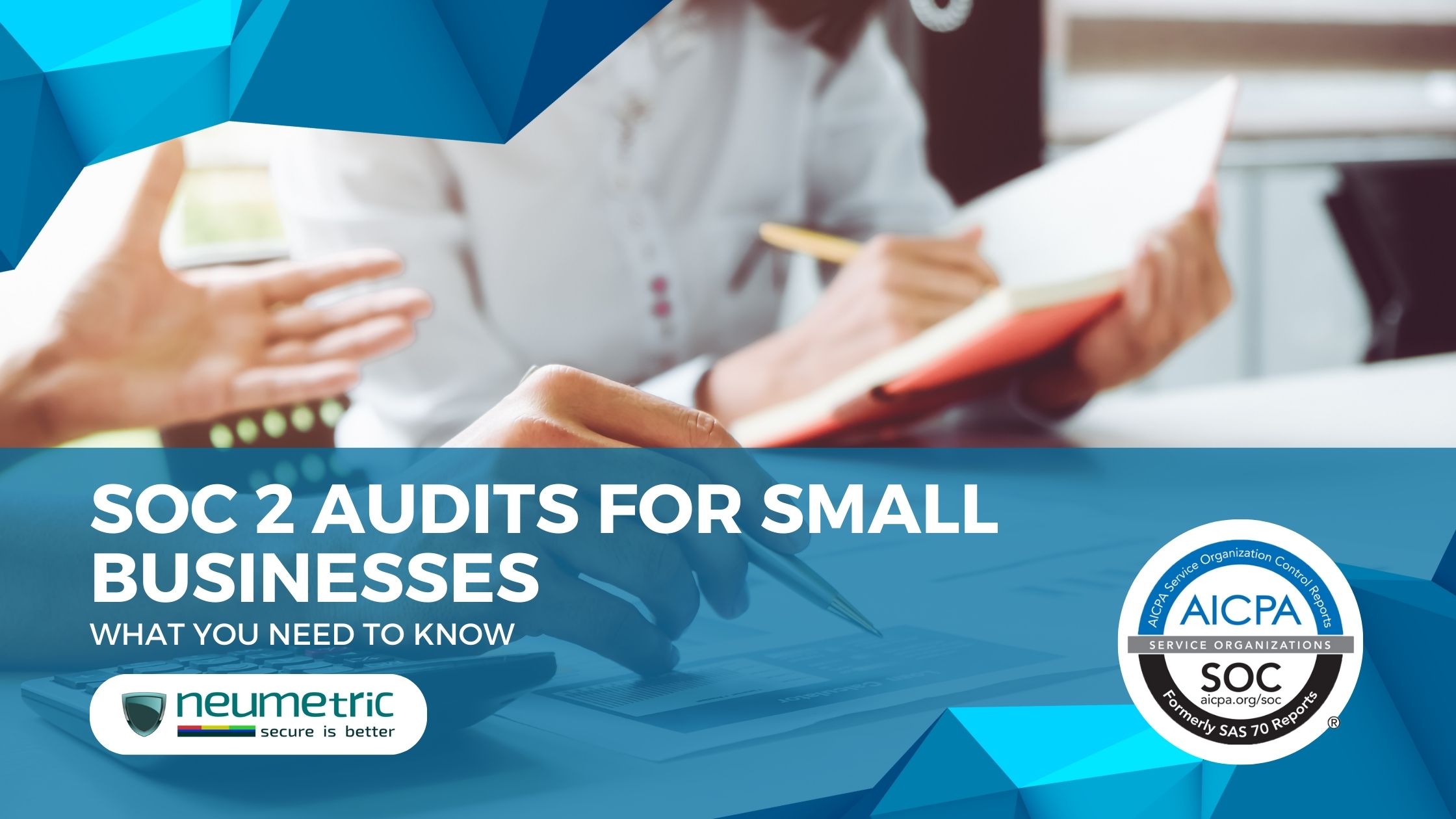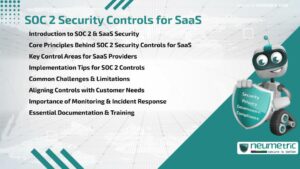Table of Contents
ToggleSOC 2 Audits for Small Businesses: What You Need to Know
Introduction
Service Organization Control 2 [SOC 2] is an Auditing Framework developed by the American Institute of Certified Public Accountants [AICPA] that measures a Service Organisation’s ability to protect Customer Data & maintain the privacy & security of information. It is a framework that provides information to users of financial statements about the quality of management, operational & control systems & the corporation’s processes.
SOC 2, although not legally mandated, has gained growing significance for businesses, particularly small ones, to showcase their dedication to robust security & data protection practices. Conducting a SOC 2 Audit is highly valuable for small businesses as it boosts customer trust, offers a competitive edge, ensures compliance, reduces risks & fosters partnerships with larger organisations.
The SOC 2 Audit process involves several steps & requirements. Here are some of the steps involved: Scope Definition, Identification of applicable Trust Services Criteria [TSC], development & implementation of Policies & Procedures, performing Gap Analysis, engaging an Auditor & Audit Planning & Audit Preparation.
Determine the Scope of the Audit
SOC 2 Audits have two main types: SOC 2 Type 1 & SOC 2 Type 2. Here’s an explanation of each type:
- SOC 2 Type 1: A SOC 2 Type 1 Audit assesses the design suitability of controls at a specific point, focusing on their effectiveness in meeting Trust Services Criteria (Security, Availability, Processing Integrity, Confidentiality & Privacy). It provides a snapshot of control design without assessing long-term operating effectiveness.
- For small businesses undergoing their initial SOC 2 Audit, a Type 1 Audit is recommended as a starting point. It enables the assessment of control design, identifying gaps or deficiencies prior to a more comprehensive evaluation.
- Type 1 Audits provide assurance to clients or stakeholders regarding the specific moment’s design & implementation of controls.
- SOC 2 Type 2: A SOC 2 Type 2 Audit evaluates controls’ operating effectiveness over a specified period (typically six (6) to twelve (12) months), ensuring consistent implementation & alignment with Trust Services Criteria.
- For small businesses with a mature control environment, a Type 2 Audit demonstrates the effectiveness & reliability of controls.
- Type 2 Audits provide a comprehensive view of controls, assessing ongoing operations & effectiveness. They are suitable for showcasing commitment to data security & privacy over a specific period.
Defining the Audit Scope is crucial for small business’ SOC 2 Audits. Tips to define the scope effectively are: Understand your Business Processes, Determine the in-scope systems & services, assess data flows & touchpoints, prioritise risk areas, consider the Trust Criteria, document the Scope clearly, review & update the Scope regularly.
Accurate Scope definition is crucial for a focused Audit. Collaborating with your Auditor & seeking guidance ensures a successful SOC 2 Audit for small businesses.
Identify Applicable Trust Services Criteria
The Trust Services Criteria [TSC] are foundational principles for SOC 2 Audits. They evaluate controls & processes of service organisations. The commonly used TSCs in SOC 2 Audits are:
- Security: The Security criterion focuses on assessing the controls implemented by an organisation to protect its systems & data from unauthorised access, unauthorised disclosure & potential damage.
- Availability: The Availability criterion evaluates the controls that ensure the system is available & accessible for operation as agreed upon.
- Processing Integrity: The Processing Integrity criterion assesses the controls that ensure the accuracy, completeness & timeliness of data processing.
- Confidentiality: The Confidentiality criterion focuses on protecting sensitive information from unauthorised disclosure.
- Privacy: The Privacy criterion evaluates the controls that protect personal information & ensure compliance with applicable privacy laws & regulations.
(Learn more about TSCs in: Understanding SOC 2 Trust Service Principles).
During a SOC 2 Audit, the organisation’s controls & processes undergo evaluation against the Trust Services Criteria. The Auditor assesses the design, implementation & operating effectiveness of controls, ensuring alignment with the criteria & demonstrating compliance with industry best practices. This comprehensive assessment of Security, Availability, Processing Integrity, Confidentiality & Privacy builds trust & confidence, meeting the expectations of clients, partners & stakeholders in protecting sensitive information.
To identify the relevant Trust Services Criteria [TSC] for your small business in preparation for a SOC 2 Audit, consider the following aspects: Understand your business operations, assess Regulatory Requirements, understand client expectations, analyse data sensitivity, consider industry standards & best practices, seek expert advice.
Develop & Implement Policies & Procedures
Policies & Procedures play a crucial role in SOC 2 Compliance for organisations. Importance of documenting Policies & Procedures are:
- Establishing a Framework: Policies & Procedures provide a structured framework for addressing security, privacy & other control objectives required by the SOC 2 framework.
- Demonstrating Compliance: Well-documented Policies & Procedures serve as evidence of the organisation’s commitment to meeting the requirements of SOC 2.
- Consistency & Standardization: Policies & Procedures promote consistency in how tasks & activities are performed across the organisation.
- Employee Awareness & Training: Policies & Procedures serve as valuable resources for educating employees about their roles & responsibilities regarding security, privacy & compliance.
- Risk Management & Incident Response: Policies & Procedures provide a roadmap for managing risks & responding to security incidents or data breaches.
- Auditing & Monitoring: Well-defined Policies & Procedures enable organisations to conduct Internal Audits & ongoing monitoring activities effectively.
Policies & Procedures are vital for SOC 2 compliance as they serve as a foundation for establishing & maintaining a robust control environment that aligns with the requirements of SOC 2.
Developing & Implementing Policies & Procedures that meet SOC 2 requirements can be a complex task. To help you in this process, some of the tips are to: Understand the SOC 2 Requirements, Conduct a Gap Analysis, Involve Relevant Stakeholders, Tailor Policies to Your Organisation, Clearly Define Roles & Responsibilities, Document Policies & Procedures, Communicate & Train Employees, Regularly Review & Update, Seek Professional Assistance.
Perform a Gap Analysis
A Gap Analysis assesses an organisation’s controls, policies & procedures against a standard like SOC 2. It identifies gaps & provides a roadmap for achieving compliance.
In the context of SOC 2 Compliance, a Gap Analysis is important for several reasons:
- Identifying areas of non-compliance: A Gap Analysis helps pinpoint areas where the organisation’s existing controls, policies or procedures fall short of meeting the SOC 2 requirements.
- Prioritising Remediation Efforts: The Gap Analysis allows the organisation to prioritise the areas of non-compliance based on their level of risk & significance.
- Developing Action Plans: By identifying specific gaps, the Gap Analysis enables the organisation to develop actionable plans for remediation.
- Resource Allocation: The Gap Analysis helps allocate resources effectively. It provides insights into the areas requiring additional investments, such as staff training, technology upgrades, or policy development.
- Demonstrating Due Diligence: A comprehensive Gap Analysis & the subsequent remediation efforts demonstrate the organisation’s commitment to SOC 2 compliance.
- Continual Improvement: The Gap Analysis process is not a one-time activity. It promotes a culture of continuous improvement by highlighting areas for enhancement & monitoring progress over time.
Performing a Gap Analysis & addressing identified gaps is crucial for achieving SOC 2 compliance. To help you in this process, some of the tips are to: understand the SOC 2 Requirements, identify control objectives, evaluate current controls, prioritise & rank gaps, develop remediation plans, implement controls, monitor & test, document, review & improve, seek external validation.
Engage an Auditor
An Auditor’s role in the SOC 2 Audit process is to examine & evaluate an organisation’s controls related to the Trust Services Criteria (Security, Availability, Processing Integrity, Confidentiality & Privacy). The Auditor assesses risks, tests controls, provides recommendations for deficiencies & issues a detailed SOC 2 report on control effectiveness.
Auditors play a crucial role in SOC 2 Audits by assessing compliance, planning, conducting fieldwork, evaluating controls, reporting findings & providing guidance for improvement. When selecting an SOC 2 Auditor for your small business, it’s important to consider their experience, knowledge, industry expertise, familiarity with the SOC 2 framework, communication skills, resources, professional credentials, reputation, cost & compatibility.
Look for Auditors with specific experience working with small businesses, understanding of their unique requirements & knowledge of the SOC 2 framework & Trust Services Criteria. Assess their ability to communicate effectively & collaborate with small businesses & ensure they have the necessary resources & support. Verify their professional credentials & reputation & consider the value they bring to your organisation. Trust your instincts & choose an Auditor with whom you feel comfortable & can establish a good working relationship.
Prepare for the Audit
The SOC 2 Audit preparation process involves several steps to ensure that the Service Organisation is ready for the Audit. These steps are:
- Scoping & Planning: The first step is to define the Scope of the Audit, which includes identifying the systems, processes & control objectives to be evaluated.
- Gap Analysis: The Service Organisation conducts a comprehensive Gap Analysis to identify any control deficiencies or areas where it does not meet the TSC requirements.
- Remediation: Based on the Gap Analysis, the Service Organisation addresses the control deficiencies by implementing or enhancing controls to meet the TSC requirements.
- Documentation & Evidence Gathering: The Service Organisation prepares the necessary documentation to support the implementation & effectiveness of its controls.
- Pre-Audit Testing: Before the actual Audit, the Service Organisation may perform pre-Audit testing to assess the effectiveness of its controls & ensure they are operating as intended.
- Audit Fieldwork: The SOC 2 Audit typically involves on-site or remote fieldwork conducted by the Auditor. During this phase, the Auditor performs testing procedures to evaluate the design & operating effectiveness of the controls.
- Audit Findings & Report: After completing the Audit fieldwork, the Auditor provides the Service Organisation with a report that outlines the findings.
- Remediation & Follow-up: If any control deficiencies are identified, the Service Organisation should address them by implementing appropriate remediation measures.
During the SOC 2 Audit, the Service Organisation can expect the Auditor to:
- Evaluate the design & implementation of controls.
- Assess the alignment of controls with the TSC requirements.
- Review documentation, Interview personnel & Request evidence.
- Identify & report control deficiencies.
- Provide recommendations for improvement.
Preparing for a SOC 2 Audit involves careful planning & preparation. Some tips to help you in this process are: understand the SOC 2 Framework, create a readiness checklist, conduct a gap analysis, establish Policies & Procedures, implement controls & processes, educate & train employees, conduct mock Audits, document evidence, engage external experts, continuously monitor & improve.
Conclusion
In conclusion, SOC 2 Audits hold significant importance for small businesses as they enhance customer trust, provide a competitive advantage, align with compliance requirements, mitigate risks & facilitate partnerships with larger organisations. The key steps involved in the SOC 2 Audit process include determining the Audit scope, identifying applicable Trust Services Criteria [TSC], developing & implementing Policies & Procedures, performing a Gap Analysis, engaging an Auditor & preparing for the Audit.
It is crucial for small businesses to define the Audit scope accurately, select an Auditor experienced in working with small businesses & adequately prepare for the Audit by addressing control deficiencies, gathering evidence & conducting Pre-Audit testing. By following these steps & seeking expert guidance, small businesses can achieve SOC 2 compliance & demonstrate their commitment to data security & privacy.
FAQs
Who needs a SOC 2 Audit?
Businesses of all sizes, including small ones, can benefit from a SOC 2 Audit. It is especially relevant for organisations that handle sensitive customer data, provide services involving data security or privacy or aim to demonstrate their commitment to strong security practices.
Which Audit is suitable for small business?
A Type 1 SOC 2 Audit is suitable for small businesses as it assesses the design of controls & identifies any gaps or deficiencies before a more comprehensive evaluation.
How much does a SOC Type 2 Audit cost?
The cost of a SOC Type 2 Audit can vary depending on several factors, such as the size & complexity of your organisation, the scope of the Audit, the chosen Audit firm & the duration of the assessment. It is recommended to obtain quotes from different Audit firms to get an accurate estimate of the cost. However, the costs usually range from ₹4,00,000/- INR to ₹8,00,000/- INR.
(Learn more about SOC 2 Audit Cost in: How much SOC 2 Certification Cost]).
Does my company need SOC 2?
Although not mandatory, SOC 2 certification is essential for small businesses that want to showcase their commitment to strong security & data protection practices. It can enhance customer trust, align with compliance requirements, provide a competitive advantage, mitigate risks & facilitate partnerships with larger organisations. Assessing your business’s specific needs & goals can help determine if pursuing SOC 2 certification is beneficial.





